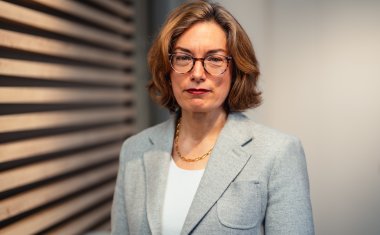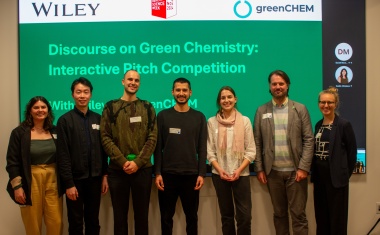Contributing to the Circular Economy
Cellugy was founded two years ago by a diverse team of young academics and professionals from Spain, Indonesia, Albania, and Denmark. Working together at Aarhus University in Denmark, the idea of developing a material based on nanocellulose as an alternative to plastic barrier coatings arose and grew into a start-up and a first product. Co-founders Isabel Alvarez-Martos and Deby Fapyane talk about their motivation and vision.





CHEManager: Cellugy was founded 2 years ago. How did it all start?
Isabel Alvarez Martos: One of the co-founders and I met while working at Aarhus University. We shared lab spaces together and many delicious meals. When shopping for food, we found out that both of us are not happy about buying organic food that is wrapped in plastic. From there, the idea of developing a new material from renewable resources to replace the plastic arose. We presented the idea in a university case challenge in the climate category. It was fundamental for us to test public’s perception of the problem we had with plastic packaging, but also take on the opportunity to replace it with more sustainable materials.
What does the name Cellugy mean, where does it come from?
I. Alvarez Martos: For a biotechnology company, to succeed, the brand might not have the same priority as the other company matters, however for us, communication of our products comes together with a certain educational value to the general public, in example: on how to treat packaging at the end of life, dependent on the type of material used. Our core technology is the production of nanocellulose using a fermentation process, very similar to the one used to make beer. That’s why we named the company Cellugy. It stands for green cellulose.
There are several companies working on materials made of cellulose. What is the USP or differentiating feature of Cellugy?
Deby Fapyane: Cellugy has designed a biomaterial able to replace plastics in several packaging applications, which is completely harmless to the environment. Being made of nanocellulose, our product EcoFlexy can be either recycled in the paperboard stream or home composted, whereas if leaking into the environment it safely biodegrades in a short time, leaving no toxic residues behind. And what is also worth mentioning: the EcoFlexy production emits 94% less CO2 emissions compared to the production of conventional plastics and at the same time enables a circular economy for hard-to-recycle packaging products.
Which obstacles did you have to master so far during the Cellugy journey?
I. Alvarez Martos: we have applied a step-by-step approach to building Cellugy and developing EcoFlexy. On our journey, we became very agile in the way we initially communicate and partner up with stakeholders throughout the supply chain, and as a result, we could realize many start-up milestones in a relatively short period of time.
On the other hand, fundraising has been a monster task as we aimed at strengthening the technology before going into VC funding. Nevertheless, with the support of different Danish and international funding schemes, and other entrepreneurial programs, Cellugy has been for two years “self-incubated”, raising approx. € 1 million for developing our MVP and shaping the company’s values. Such a commitment is thanks to having ’true-to-the-cause’ co-founders and advisors, with the right expertise and experience on technical and business matters.
What have been the most exciting projects so far?
D. Fapyane: For a scientist, international recognition of your work is of great motivation. Cellugy has designed EcoFlexy, a breakthrough biomaterial that receives tremendous attention once people and companies get to know about it. Preparing for the Ocean Plastic Innovation Challenge, by National Geographic and Sky Ocean Ventures, was the most exciting project. The idea of meeting other worldwide start-ups, who are designing advanced materials and new technologies to tackle the plastic waste issue, is thrilling, and the inspiration you get while sharing experiences in such an environment is exactly what you need. We received the runners-up prize in the competition and came home with an investment commitment.
What will be the next steps to develop Cellugy
I. Alvarez Martos: We are working hard to strengthen the core technology and secure partnerships with key players in the packaging market that help us validate our product in their operational environment. By 2025, we expect to have the full protection of our intellectual property, and in addition, we envisage exploring different applications of EcoFlexy such as an eco-friendly reinforcement agent for the construction and automotive industry and an eco-friendly microbead component for the cosmetic and pharmaceutical industry.

PERSONAL PROFILE
Isabel Alvarez Martos has a B.Sc. and a Ph.D. degree in Chemistry from the University of Oviedo, Spain. During her former academic career, she published 20 original papers including two book chapters and received the prestigious ‘Marie Sklodowska-Curie’ Individual Fellowship as well as several other research grants from the Spanish Ministry of Education and Science. Her work was developed at the interface between materials science, electrochemistry, and biochemistry.
Deby Fapyane has a B.Sc. degree in Pharmacy from the University of Airlangga, Indonesia, an MSc degree in Environmental Engineering from the Gwangju Institute of Science & Technology, South Korea, and a Ph.D. in Nanoscience from Aarhus University, Denmark. She has published to date 15 publications in international peer-reviewed journals and gained extensive experience in enzyme and microbiology technologies with a focus on environmental applications. Her research has always been commercially oriented and multidisciplinary.
BUSINESS IDEA
Replacing Plastic with Biomaterial
Cellugy is an award-winning biotechnology company with the objective of designing disruptive nanocellulose materials that enable more readily recyclable alternatives to conventional packaging composed of multiple materials (often including polyethylene, aluminum, and wax). The Danish start-up is introducing their first product EcoFlexy to packaging companies and chemical companies serving the packaging industry and, indirectly, to brand owners. The company’s short-term focus is the food industry as one of the major and more challenging sectors contributing to packaging waste. EcoFlexy has been developed for replacing plastic with biomaterial and showcases the following benefits: Fossil-free: EcoFlexy is made from renewable resources. The production of nanocellulose from both sugar and agro-industrial waste has been demonstrated.
Edible: The product is made from nanocellulose, a natural fiber that has been ’Generally Recognized As Safe’ (GRAS) by the FDA. It is thus edible, will not suffocate sea animals, and is ideally positioned to be used for food packaging. Biodegradable at ambient conditions: EcoFlexy disintegrates completely within four weeks according to the EN 13432 for home composting.
Recyclable in the paperboard stream: As nanocellulose has the same chemical structure as cellulose in the pulp, EcoFlexy can be recycled alongside cardboard and paper. High oxygen barrier: The use of EcoFlexy as barrier material allows to extend food shelf-life and preserve freshness while being a mono-material packaging solution. Suitable for the food packaging industry: In addition to the environment-friendly properties outlined above, EcoFlexy is compliant with EU regulations for food contact materials.
Cellugy is fully aligned with the United Nations Sustainable Development Goals (UN SDGs), responding directly to SDGs 12, 13, and 14 since the start-up tackles several problems at once: the plastic epidemic, food, and agricultural waste production, and the sustainability of packaging. Next for Cellugy: The team aims at enhancing the society’s sense of community, cooperation and participation through circular economy, while facilitating end-of-life management.
ELEVATOR PITCH
Award-winning Biotechnology
Cellugy was founded in Spring 2018 by a diverse team of young professionals from Spain, Indonesia, Albania, and Denmark. Challenged by the idea that plastic is linked to almost every purchase that we make, and the majority of this plastic is not suitable for recycling; the team focused their energy on developing a distinctive material that is environmentally sustainable and satisfies the packaging requirements. The proof-of-concept and working prototypes of the material named EcoFlexy are being trialed with early industry and knowledge-based partners. Currently, Cellugy is an 80% women-led team moving towards exploiting the opportunities that white biotechnology represents in producing nanocellulose as an alternative to plastic barrier coatings.
MILESTONES
2018
- Foundation of Cellugy
- R&D and Technology validation on lab-scale
- Top 3 foodtech companies in Europe by TechTour European Venture Contest in Dusseldorf, Germany
- Bootstrapping of the initial financing of 65,000 EUR
2019
- Validation of technology and first proof-of-concept agreements with industrial partners
- Top 10 cleantech start-ups at Nordic Cleantech Open 2018/2019 edition
- Food Innovation Prize of the European Institute of Innovation and Technology (EIT)
- Winner of the Advanced Materials Competition of the Innovation Network for Advanced Materials (INAM) in Berlin, Germany
- Winner of the Global Innovation Summit in China, by InnoEU
- Runners-up in the National Geographic and Sky Ocean Ventures Ocean Plastic Innovation Challenge in Washington, DC, USA
2020
- Sky Ocean Ventures becoming first
- investor in Cellugy
- RoadMap
2021
- Fermentation technology scaled
- Signing with partners to co-develop EcoFlexy-based packaging products
2022
- Market introduction of EcoFlexy
- Pilot plant set-up




